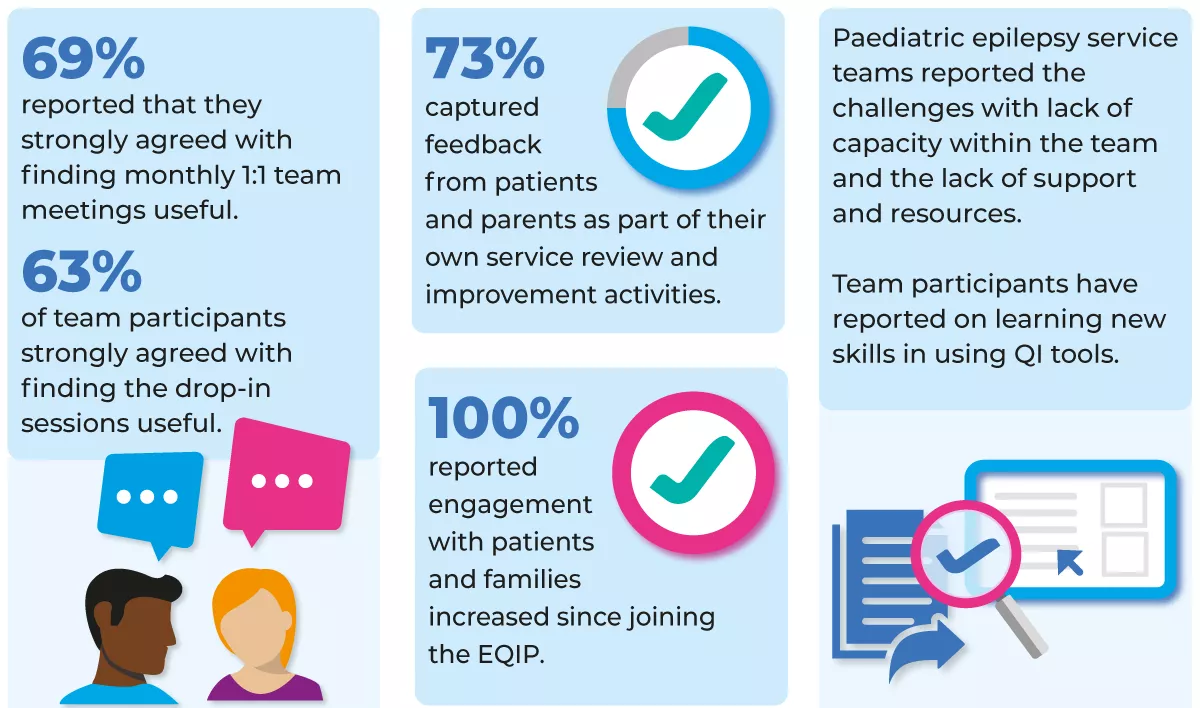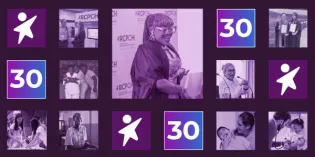Our impact report explains how a whole team approach, co-production with children and young people and improved skills drive improvements in epilepsy care for children and young people.
The EQIP teams' case studies give an insight on their local improvements, covering a wide range of QI themes, such as mental health support, transition pathways and health inequalities.
We also have a summary report from the last year of the programme, plus evaluation results from each training wave.
Impact report 2019-23
The RCPCH EQIP successfully ran four training waves between 2019 and 2024 with paediatric epilepsy teams in England and Wales.
Our impact report, published August 2024, evaluates the progress and outcomes of initiatives with paediatric epilepsy service teams and the wider multidisciplinary team (MDT). It covers key areas such as team working, communication, engagement and interaction with service teams. It highlights the importance of continuous support, tailored solutions and comprehensive team training - which improves engagement, communication and effectiveness in delivering care.
This report also details the College's efforts to provide training, integration, expertise and mentoring to healthcare professionals, focusing on improving the quality of care for children and young people with epilepsy through QI initiatives.
Here's a summary of some of the key messages:

The impact report includes an outline of the projects and outcomes of the participating teams in the first three waves of the project (between 2019 and 2023). Teams noted significant improvements in teamwork, communication and service delivery. (A summary of the outcomes for the 2023-24 training wave will be published in autumn 2024.)
By sharing good practice and lessons learned, we hope to emphasise the role of network links and the sharing of successful strategies in overcoming barriers and challenges within paediatric epilepsy services.
Download the impact report from the bottom of this page
Case studies from EQIP teams
Participating teams wrote up case studies of their work with EQIP. These look at the challenges of overcoming barriers and ideas, both adopted and abandoned. They include evidence in the form of data, photos or images of engagement, and project outcomes, and some have accompanying presentation video recordings. We hope these case studies facilitate shared learning and inspire other paediatric epilepsy service teams to begin their own QI journey!
(Note the case studies that include the outcomes of their national audit results cannot be solely attributed to the outcomes of the project interventions developed during the RCPCH EQIP.)
Read the case studies on the EQIP microsite
Summary report 2023-24
Our summary report, published September 2024, evaluates the outcomes of EQIP teams' initiatives in the programme's last year. You can read how teamwork, QI training and data-driven approaches have transformed services across England and learn about the impactful changes made to better support children, young people, and their families.
We have also published a supplement of 2023-24 improvement case studies by paediatric epilepsy service teams.
Key messages:
- Growth in leadership skills and the use of QI methodologies led to more cohesive team dynamics and standardised processes.
- Increased engagement with children, young people and their families created a deeper understanding of their needs have helped address health inequalities and improve care delivery.
- EQIP teams' projects highlighted the many validated screening tools available to service teams - but, by engaging children, young people and their families, it became clear that not all tools met the needs of all patients
Download the summary report and case studies supplement from the bottom of this page
Evaluation reports from each EQIP wave
We invited individuals from participating teams to submit a questionnaire both before and after they participated in EQIP. This aimed to evaluate what they had learned and the effectiveness of the programme.
We have written up a detailed evaluation report, based on the submitted questionnaires, for each wave of the EQIP.
Download the evaluation reports from the bottom of this page
- Background to EQIP
-
The RCPCH Epilepsy Quality Improvement Programme (EQIP) was designed to provide comprehensive team training in Quality Improvement (QI) methods for paediatric epilepsy service teams across England and one in Wales.
Managed by RCPCH, the programme was initially funded by NHS England and the Welsh government in 2019-20 and recommissioned in 2021 by the NHS England Children and Young People (CYP) transformation team.
EQIP aimed to address disparities in care highlighted by the RCPCH Epilepsy12 national audit. Its focus was on building QI skills, enhancing team capabilities and fostering collaboration to achieve sustainable improvements in paediatric epilepsy services across England and Wales.
EQIP provided tailored solutions, training and mentorship to healthcare professionals to elevate the standard of care for children and young people with epilepsy through QI efforts.
See more general information about EQIP on this website or see our EQIP microsite.







